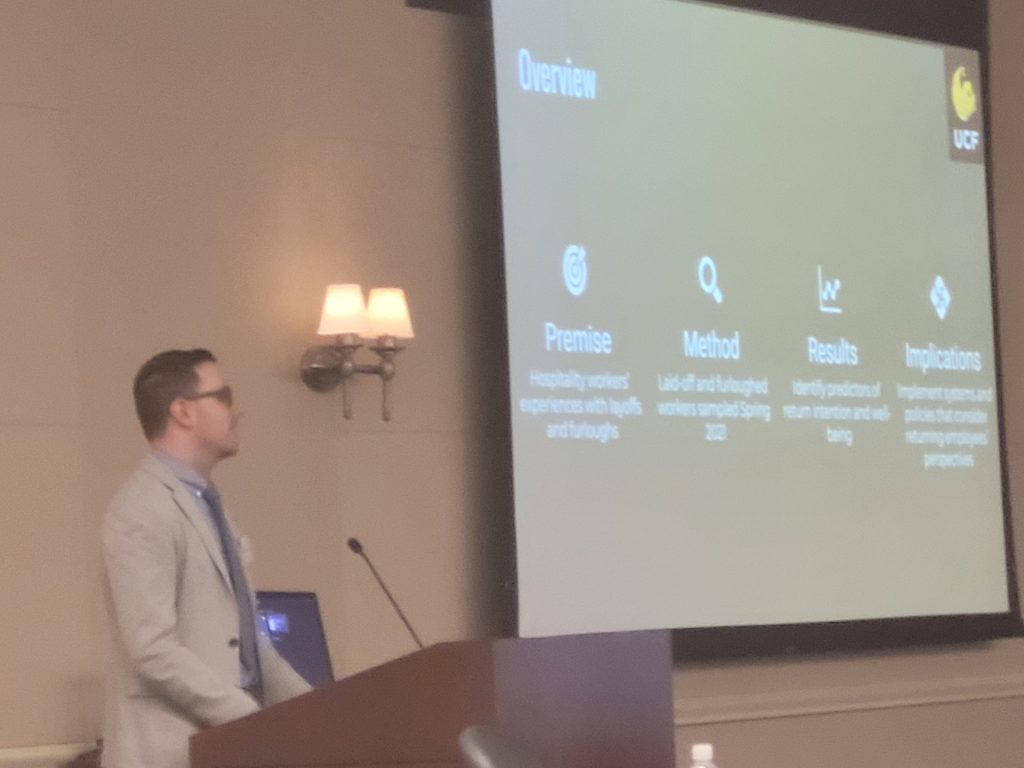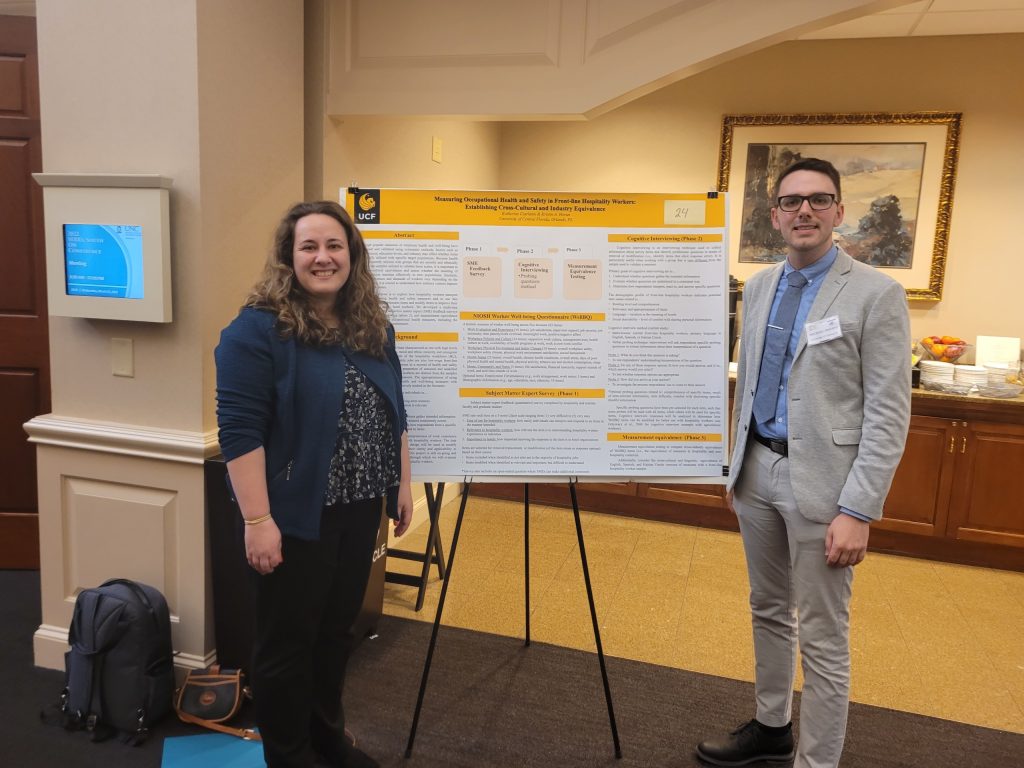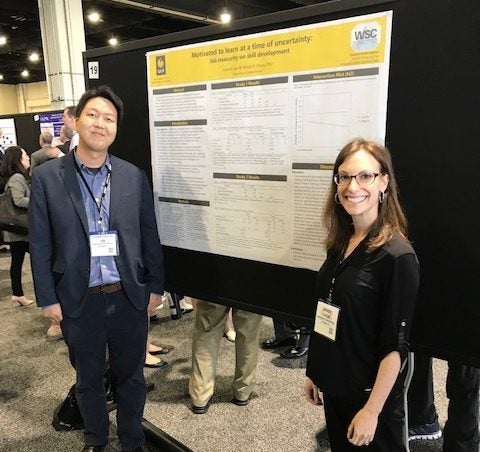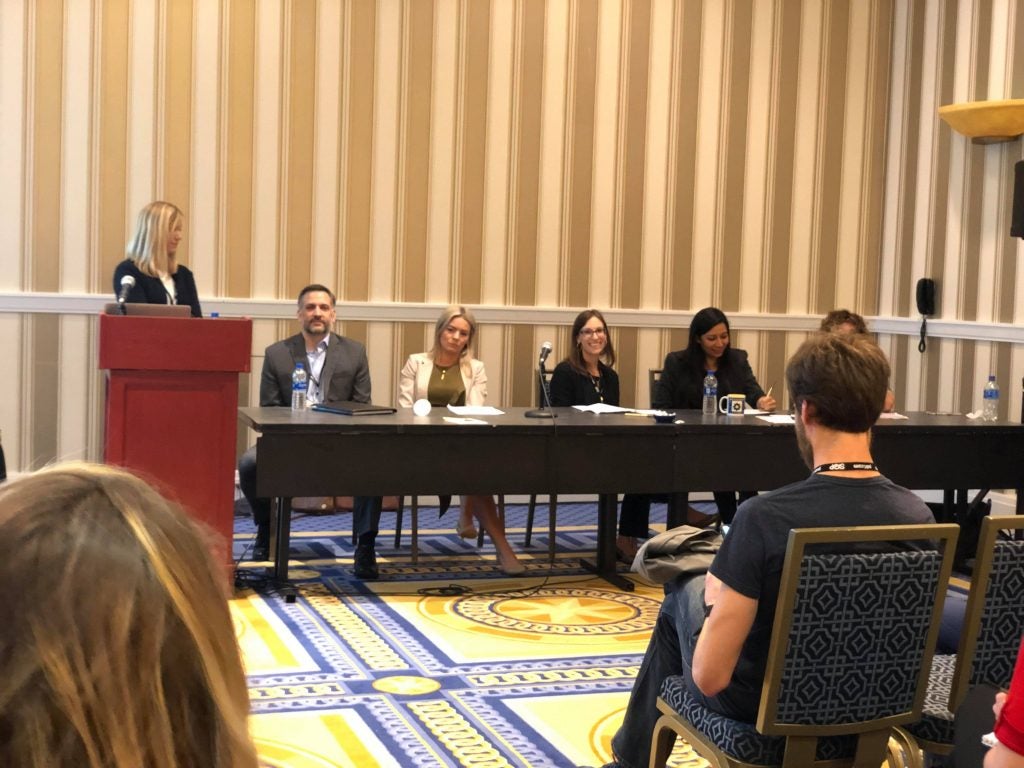Selected Journal Publications
Shoss, M. K., & Ciarlante, K. † (In press). Are robots/AI viewed as more of a workforce threat in unequal societies? Evidence from the Eurobarometer survey. Technology, Mind, and Behavior: Special Issue in Work, Technology, and Inequality.
“Our study of the Eurobarometer data suggests that societal inequality—both objective and perceived—is associated with the extent to which people view AI/robots as threats to jobs in general. This relationship occurs even when accounting for people’s perceptions of technology-related threats to their own jobs as well as demographic factors and technology experience.”
Shoss, M. K. & Foster, L. (In press). We should also aim higher: IO psychology applied to sustainable growth and development. Industrial-Organizational Psychology: Perspectives on Science and Practice. Peer-reviewed commentary to Schneider & Pulakos focal article.
“We consider here the potential for I/O Psychology to contribute to an understanding of sustainable growth and development at the societal level. The notion of sustainable growth and development captures the interconnectedness between work, well-being, and society.”
Selenko, E., Bankins, S., Shoss, M. K., Warbuton, J. †, & Restubog, S. (In press). Artificial intelligence and the future of work: A functional-identity perspective. Current Directions in Psychological Science.
“We argue that the conditions for AI to either enhance or threaten workers’ sense of identity derived from their work depends on how the technology is functionally deployed (by complementing tasks, replacing tasks, and/or generating new tasks), and how it affects the social fabric of work.”
Shoss, M. K., Su, S., Schlotzhauer, A.†, Carusone, N.† (In press). Working hard or hardly working? An examination of job preservation responses to job insecurity. Journal of Management.
“These studies suggest that job insecurity is associated with greater strategic behavior when employees are facing proximal threats to their jobs; however, these efforts are rarely in the best interest of organizations.”
Shoss, M. K., Van Hootegem, A. †, Selenko, E., & De Witte, E. (In press). The job insecurity of others: On the role of perceived national job insecurity during the COVID-19 Pandemic. Economic and Industrial Democracy. Link
“The study finds that higher perceptions of the prevalence of job insecurity in one’s country is associated with greater perceptions of government psychological contract breach and poorer perceptions of the government’s handling of the COVID-19 crisis, but at the same time is associated with greater social solidarity and compliance with COVID-19 social regulations. These findings are independent of individuals’ perceptions of threats to their own jobs.”
Shoss, M. K. & Kueny, C. (In press). From speculation to substantiation: Empirically-testing societal changes in impact of fit on job satisfaction from 1989, 1998, 2006, and 2016. Group & Organization Management. https://doi.org/10.1177/10596011211058545
“In more recent times, workers do appear to be more dissatisfied by work that does not meet their expectations. We see this as something positive. Workers who want to make a difference are less satisfied in positions where they can’t accomplish these goals.”
Check out more in our blog post on Social Science Space that asks “Is Job Satisfaction Changing?”
Posey, C., & Shoss, M. (2022). Why employees violate cybersecurity policies. Harvard Business Review. https://hbr.org/2022/01/research-why-employees-violate-cybersecurity-policies
” As the myriad stresses of the pandemic make it harder to maintain productivity, that means that security tends to take a backseat to the critical tasks that drive performance reviews, promotions, and bonuses.”
Shoss, M. (2021). Occupational health psychology research and the COVID-19 pandemic. Journal of Occupational Health Psychology. Invited editorial.
“Most estimates suggest the COVID-19 pandemic will be one of many crises that society will face in the impending future (Boin, 2019). OHP researchers have the unique opportunity—and perhaps, responsibility—to make sure we have the right ideas ready to help workers, organizations, and society address these events when they occur.”
Naranjo, A.†, Shoss, M. K., Gebben, A.†, DiStaso, M.†, & Su, S. (2021). When minor insecurities project large shadows: A profile analysis of cognitive and affective job insecurity. Journal of Occupational Health Psychology, 26, 421-436. doi: https://doi.org/10.1037/ocp0000294
“Might there be some individuals for whom job loss may be so detrimental that they experience high levels of worry even if they view job loss as less likely? To answer this question, the present study leveraged research on future-oriented cognition to investigate profiles of cognitive and affective job insecurity (JI). We examined how economic job dependency relates to different profiles of JI experiences as well as the implications of these profiles for understanding heterogeneity in work strain.”
Kriz, T., Jolly, P., & Shoss, M. K. (2021). Coping with organizational layoffs: Managers’ increased active listening reduces job insecurity via perceived situational control. Journal of Occupational Health Psychology, 26, 448-458. doi: https://doi.org/10.1037/ocp0000295
“Our findings suggest that in environments characterized by widespread change and impending job loss, an increase in active listening may have a ripple effect in increasing perceived control and decreasing affective job insecurity.”
Horan, K., Shoss, M. K., Mejia, C., & Ciarlante, K. † (2021). Industry context as an essential tool for the future of healthy and safe work: Insight for Occupational Health Psychology from the hospitality industry. National Institute for Occupational Safety and Health-sponsored Special Issue of the International Journal of Environmental Research and Public Health on “Worker Safety, Health, and Well-Being in the USA”, 18, doi: https://doi.org/10.3390/ijerph182010720
“As occupational safety and health disciplines answer the call provided by the future of work, this review provides an account for the value of industry context and recommendations for achieving both breadth and depth of scientific inquiry and practical reach.”
Ng, M.†, Naranjo, A. †, Schlotzhauer, A. †, Shoss, M. K., Kartvelishvili, N. †, Bartek, M. †, Ingraham, K. †, Rodriguez, A. †, Schneider, S. †, Seltzer, L. †, & Silva, C. † (2021). Has the COVID-19 pandemic accelerated the future of work or changed its course? Implications for research and practice. National Institute for Occupational Safety and Health-sponsored Special Issue of the International Journal of Environmental Research and Public Health on “Worker Safety, Health, and Well-Being in the USA”, 18, doi: https://doi.org/10.3390/ijerph181910199
“The aim of the current paper is to assess the impact of the COVID-19 pandemic on commonly discussed future of work trends relevant to occupational safety and health priority areas. These topics include work arrangements, compensation and benefits, and the organization of work…. Overall, the pandemic appears to have both accelerated and disrupted various trends associated with future of work topic areas.”
Min, H., Peng, Y., Shoss, M. K., Yang, C. (2021). Using machine learning to investigate the public’s emotional responses to work from home during the COVID-19 pandemic. Journal of Applied Psychology, 106, 214-229. https://doi.org/10.1037/apl0000886.
“The public’s anger, disgust, fear, and sadness toward WFH showed large declines when stay-at-home orders started (and a large immediate rise in joy); whereas the public’s anger and disgust showed a large rise when the orders ended (and a large immediate decline in joy). The slopes of the emotion trajectories during and after the order also indicated the effects of the order diminished as its novelty and disruption decreased over time.”
Carusone, N. †, Pittman, R. †, & Shoss, M. K. (2021). Sometimes it’s personal: Differential outcomes of person vs job at risk threats to job security. International Journal of Environmental Research and Public Health, Special Issue on “Job Insecurity and Precarious Employment as Psychosocial Risk Factors in Contemporary Society”, 18, doi: https://doi.org/10.3390/ijerph18147379
“Participants in a person-at-risk scenario indicated more negative reactions to job in- security, as captured by greater anticipated negative affect and poorer perceived social exchanges and organization-based self-esteem.”
Shoss, M. K., Horan, K., DiStaso, M.†, LeNoble, C., & Naranjo, A.† (2021). The conflicting impact of COVID-19’s health and economic crises on helping. Group & Organization Management, 46, 3-37. https://doi.org/10.1177/1059601120968704.
“Consistent with economic crisis logic, macro-level concern about recession was negatively associated with interest in helping. Moreover, at the individual level, work-hour insecurity negatively predicted helping coworkers. Consistent with disaster logic, at the individual level, perceived job-related COVID-19 threat was positively associated with helping coworkers and negatively associated with helping customers.”
Mejia, C., Pittman, R.†, Beltramo, J. M. D.†, Horan, K. A., Grinley, A.† & Shoss, M. K. (2021). Stigma and dirty work: In-group and out-group perceptions of essential service workers during COVID-19. International Journal of Hospitality Management, 93, https://doi.org/10.1016/j.ijhm.2020.102772.
“This study utilized occupational stigma theory to identify the mechanisms under which both essential service workers and society at large came to unify around the importance of perceived dirty work in the United States.”
Striler, J.†, Shoss, M. K., & Jex, S. (2021). The relationship between stressors of temporary work and counterproductive work behavior. Stress and Health, 37, 329-340. Advance online publication. https://doi.org/10.1002/smi.2998.
“Three waves of data show that temporary workers experiencing higher levels of economic hardship, interpersonal conflict and organizational constraints reported greater emotional exhaustion, which was linked to increased frequency of CWBs. Additionally, higher levels of job insecurity and interpersonal conflict were related to higher levels of moral disengagement, which related to increased frequency of CWBs.”
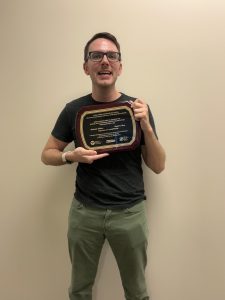
DiStaso, M.†, & Shoss, M. K. (2020). Looking forward: How anticipated workload change influences the present workload-emotional strain relationship. Journal of Occupational Health Psychology, 25, 401–409. https://doi.org/10.1037/ocp0000261.
**Awarded Best Paper for Journal of Occupational Health Psychology papers published in 2019 & 2020**
“We found that anticipation of a workload increase exacerbated the current workload- emotional strain relationship and anticipation of a workload decrease buffered this relationship … In other words, employees are more likely to tolerate stressful circumstances if they see the proverbial “light at the end of the tunnel.”
Rudolph, C. W., Allan, B*., Clark, M. *, Hertel, G. *, Hirschi, A. *, Kunze, F. *, Shockley, K. *, Shoss, M. *, Sonnentag, S. *, & Zacher, H. * (2020). COVID-19: Implications for research and practice in industrial and organizational psychology (Feature article). Industrial and Organizational Psychology: Perspectives on Research and Practice, 14, 1-35. *shared authorship.
“The topics discussed herein include occupational health and safety, work-family issues, telecommuting, virtual teamwork, job insecurity, precarious work, leadership, human resources policy, the aging workforce, and careers. This article sets the stage for further discussion of various ways in which IO psychology research and practice can address the impacts of COVID- 19 for work and organizational processes that are affecting workers now and will shape the future of work and organizations in both the short and long term.”
Kueny, C. R., Francka, E. C.†, Shoss, M. K., Headrick, L. †, & Erb, K. (2020). Ripple effects of supervisor counterproductive work behavior directed at the organization: Using affective events theory to predict subordinates’ decisions to enact CWB. Human Performance, 33, 355-377. https://doi.org/10.1080/08959285.2020.1791871.
“Results suggest that supervisor CWB-O enacted in the context of a negative supervisor-subordinate relationship as well as severe, frequent supervisor CWB-O elicits negative subordinate reactions leading to greater intentions to enact CWB themselves.”
Shoss, M. K., Brummel, B., Probst, T., & Jiang, L. (2020). The joint importance of secure and satisfying work: Insights from three studies. Journal of Business and Psychology, 35, 297-316. https://doi.org/10.1007/s10869-019-09627-w.
“Overall, the results suggest that job insecurity is more detrimental among those most satisfied with their jobs….The interactive effects of job satisfaction and job insecurity also suggest that job insecurity counteracts the benefits of otherwise satisfying jobs, which is a particularly important finding given the status afforded to job satisfaction as one of the most important outcomes in organizational psychology.”
Kueny, C. R. & Shoss, M. K. (2020). Sensemaking and negative emotion-sharing: Perceived listener reactions as interpersonal cues driving workplace outcomes. Journal of Business and Psychology. Advance online publication. https://doi.org/10.1007/s10869-020-09686-4.
Giorgi, G., Leon-Perez, J. M., Montani, F., & Shoss, M. K. (2020). Appraisal of economic crisis, psychological distress, and work-unit absenteeism: A 1-1-2 model. Journal of Business and Psychology, 35, 605-620. https://doi.org/10.1007/s10869-019-09643-w.
Babaloa, M. T., Greenbaum, R. L., Amarnani, R. K., Shoss, M. K., Deng, Y.†, Garba, O. A.†, & Guao, L.† (2020). A business frame perspective on why perceptions of top management’s bottom-line mentality results in employees’ good and bad behaviors. Personnel Psychology, 73, 19-41. https://doi.org/10.1111/peps.12355.
Lavigne, K.†, Whitaker, V.†, Jundt, D., & Shoss, M. K. (2019). When do job insecure employees adapt to change? Career Development International, Special Issue on the Impact of Job Insecurity on Job Performance, 29, 271-286. https://doi.org/10.1108/CDI-03-2019-0083.
Kueny, C. R.†, Jundt, D. K., & Shoss, M. K. (2019). Initiative in a social context: Interpersonal outcomes of individual interdependent proactive behaviour. European Journal of Work and Organizational Psychology, 28(5), 669-681. https://doi.org/10.1080/1359432X.2019.1634054.
Eisenberger, R. W., Rockstuhl, T., Shoss, M. K., Wan, X.†, & Dulebohn, J. (2019). Is the employee-organization relationship dying or thriving? A temporal meta-analysis. Journal of Applied Psychology, 104(8), 1036-1057. https://doi.org/10.1037/apl0000390.
Shoss, M. K., Jiang, L., & Probst, T. M. (2018). Bending without breaking: A two-study examination of resilience and job insecurity. Journal of Occupational Health Psychology, 23, 112-126. https://doi.org/10.1037/ocp0000060.
Shoss, M. (2018). Addressing job insecurity in the 21st Century. Work Science Center Thinking Forward Report Series. Atlanta GA: Georgia Institute of Technology. http://www.worksciencecenter.gatech.edu/thinking-forward-series. Invited white paper publication designed to inform public policy makers. Peer-reviewed.
Shoss, M. K. (2017). Job insecurity: An integrative review and agenda for future research. Journal of Management, 43, 1911-1939. https://doi.org/10.1177/0149206317691574
Book
Hoffman, B., Shoss, M. K., & Wegman, L. (Eds.) (2020). The Cambridge Handbook of the Changing Nature of Work. New York, NY: Cambridge University Press. https://doi.org/10.1017/9781108278034
Recent Presentations
(† denotes student collaborators)
Top Ten Poster Award 2023 SIOP Annual Conference:
Sharma, R. V. †, Scholtzhauer, A. E. †, Shoss, M. K. (2023). Job insecurity as a mediator between organizational crisis and knowledge hiding. Poster presented at the annual conference of the Society for Industrial & Organizational Psychology.
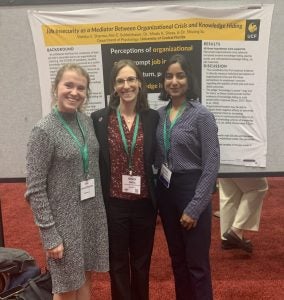
Bazzoli, A. (Chair), Shoss, M. K. (Co-chair), Alliger, G. M., Blustein, D. L., McEachern, P. J., & Saxena, M. (2023). Exploring the Space of Critical Work Psychology: Implications for Research and Practice [Panel]. Society for Industrial and Organizational Psychology.
Chao, G. T. (Chair), Landers, R. N., Nittrouer, C., Ravid, D., Shoss, M. K. (2023) The Future of Work: How I-O Psychology Advances Science and Practice [IGNITE]. Society for Industrial and Organizational Psychology Annual Conference.
Schlotzhauer, A. E. †, Shoss, M. K., & Su, S. (2022). Changes in workplace knowledge hiding during the COVID-19 pandemic. Paper presented at the annual conference of the Society for Industrial & Organizational Psychology.
DiStaso, M. †, Chaviano, G. †, & Shoss, M. Layoff and furlough events and employee well-being via job insecurity. Paper presented at the annual conference of the Society for Industrial & Organizational Psychology.
DiStaso, M. †., Grinley, A. †, Schlotzhauer, A. †, & Shoss, M.K. (2022, April)Employee Support for COVID-19 Safety Policies. Poster presented at the annual conference of the Society for Industrial & Organizational Psychology.
Su, S., Shoss, M. K., Jundt, D. K., & Tavoosi, S. †, (2022). The COVID-19 Pandemic and Repeated Adaptation: Evidence for Different Trajectories.
Su, S. (Co-Chair), Jundt, D. K. (Co-chair), & Shoss, M. K. (Co-Chair) (2022). Applying Novel Methodological and Statistical Paradigms to the Study of Adaptation [Symposium]. Society for Industrial and Organizational Psychology Annual Conference, Seattle, WA, United States.
Distaso, M. †,, Azcarate, I., †, Le, A. †, Nakahara, W. †, & Shoss, M. Return-to-work Worries and Return Intention. Poster presented at the annual conference of the Society for Industrial & Organizational Psychology.
Taylor, S., Anicich, E., Carusone, N. †, Foulk, T., Osborne, M., Schaerer, M., Shoss, M., Vogel, R. (2022, April). Why financially insecure employees mistreat coworkers. Poster presented at the annual conference of the Society for Industrial & Organizational Psychology.
Schlozhauer, A. †, DiStaso, M. †, & Shoss, M. (2021). Hospitality workers’ experiences with mistreatment anxiety during the COVID-19 pandemic. 6th World Research Summit for Tourism and Hospitality.
Nakahara, W. †, DiStaso, M. †, Le, A. †, Azcarate, I. †, Shoss, M., Mejia, C., & Jex, S. (2021, November). The influence of cognitive stress appraisals on hospitality worker’s intentions to return to their organization in the context of COVID-19. Poster to be presented at the biennial conference of Work, Stress, and Health, virtual.
Azcarate, I. †, Le, A. †, DiStaso, M. †, & Nakahara, W. †, Shoss, M., Mejia, C., & Jex, S. (2021, November). Worry about COVID-19 vaccination and mental health. Poster to be presented at the biennial conference of Work, Stress, and Health, virtual.
DiStaso, M. †, Le, A. †, Azcarate, I. †, & Nakahara, W. †, Shoss, M., Mejia, C., & Jex, S. (2021, November). Return-to-work threat appraisal: a study of hospitality workers. Poster to be presented at the biennial conference of Work, Stress, and Health, virtual.
Schlotzhauer, A. E. †, DiStaso, M. J. †, Lai, J. †, & Shoss, M. K. (2021, November). Working 9 to 5, ideally: The effects of work-hour insecurity on engagement and satisfaction. Poster to be presented at the biennial conference of Work, Stress, and Health, virtual.
Schlotzhauer, A. E. †, Shoss, M. K., Horan, K. A., Min, H., Nigam, J. A. S., & Swanson, N. G. (2021, November). Pathogens and peer pressure: The effect of coworkers on compliance with COVID-19 safety protocol. Poster to be presented at the biennial conference of Work, Stress, and Health, virtual.
Schlotzhauer, A. E. †, DiStaso, M. J. †, Lai, J. †, & Shoss, M. K. (2021, November). Working 9 to 5, ideally: The effects of work-hour insecurity on engagement and satisfaction Poster to be presented at the biennial conference of Work, Stress, and Health, virtual.
Schlotzhauer, A. E. †, Horan, K. A., Hill, E. G. †, Dye, K. †, Shoss, M. K., & Ehrhart, M. G. (2021, November). Like fine wine: Age, stress, and resilience during the COVID-19 pandemic. Poster to be presented at the biennial conference of Work, Stress, and Health, virtual.
Selenko, E., Van Hootegem, Shoss, M., & De Witte, H. (2021, August). Work changes in times of COVID: Effects on shared identity and health compliance behaviors. Paper presented at the annual meeting of the British Sociological Society.
Eadeh, F., Elfenbein, H., Fast, N. J., Gratch, J., & Shoss, M. (2021, August). Emotions, algorithms, and the future of work. Panel discussion to be presented at the annual meeting of the Academy of Management, virtual. *Authorship alphabetical.
LeNoble, C., Jay, A., Fuqua, T., Tan, C., & Shoss, M. (2021, April). The oncology nurse experience during COVID-19: Social resources & resilience. In A.F. Bessey & M.L. Shuffler (co-chairs), An examination of the impact of COVID-19 on healthcare professionals. Symposium presented at the annual conference of the Society for Industrial and Organizational Psychology, virtual.
LeNoble, C., Horan, K., Shoss, M., & Kwesell, A. (2021, April) Effects of institutional responses to the COVID-19 pandemic on undergraduate faculty and students across STEM disciplines. In C. LeNoble (chair). Making I/O research RAPID in times of crisis: Insights into quick-response NSF funding. Symposium presented at the annual conference of the Society for Industrial and Organizational Psychology, virtual.
Naranjo, A.†, LeNoble, C., Shoss, M., Horan, K., DiStaso, M.† (2021, April). Stress and resilience during COVID-19 pandemic: A SEM approach. In J.D. Terry & K.P. Cigularov (co-chairs). Stress during COVID-19: Stressors, resources, and theory. Symposium presented at the annual conference of the Society for Industrial and Organizational Psychology, virtual.
Flynn, P., Hardy, J., Howardson, G., Jundt, D., Rudolph, C., & Shoss M. (2021, April). Tackling Big Issues in Understanding Adaptation: A Discussion Across Research Domains (Chairs, Shoss & D. Jundt). Panel discussion presented at the annual conference of the Society for Industrial and Organizational Psychology, virtual. Authorship alphabetical.
Pittman, R. †, Carusone, N. †, & Shoss, M. K. (2021, April). Sometimes It’s Personal: Differential Outcomes of Person vs Job at Risk Insecurity. Poster presented at the annual conference of the Society for Industrial and Organizational Psychology, virtual.
Kueny, C., Shoss, M. K., & Jundt, D. K. (2021, April). Blind with rage: anger, anticipated outcomes, and actual outcomes of CWB. In J. Evans (Chair), Does Breaking Bad Hurt? Intrapersonal consequences of Counterproductive Work Behavior. Symposium presented at the annual conference of the Society for Industrial and Organizational Psychology, virtual.
Bergman, M., Chatterjee, D., Chattopadhyay, R, & Shoss, M. K. (2021, April). Non-professional and Unimportant? Making IO Psychology Research Inclusive of All Work (Chairs, M. Childers & M. Keith). Panel discussion presented at the annual conference of the Society for Industrial and Organizational Psychology, virtual. Authorship alphabetical.
Horan, K. A., Shoss, M. K., Mejia, M., Breiter-Terry, D. (2021, April). Hospitality employees nested social exchange relationships with their organization and industry during COVID-19. In Reynolds-Kueny, C.A. (Chair), Managing in times of uncertainty: COVID-19 impacts on work. Research incubator presented at the annual conference of the Society for Industrial and Organizational Psychology, virtual.
Horan, K. A., Scott, B. †, Farzan, A. †, Marshall, J., Masys, A. J., Shoss, M., Campos, A. †, Jex, S. M. & Orta-Anés, L.(2021, April). Understanding natural disaster resilience in hospitality organizations. Poster presented at the annual conference of the Society for Industrial and Organizational Psychology, virtual.
Shoss, M. K., LeNoble, C., Horan, K., & Kwesell, A. (2021, February). Effects of institutional responses to the COVID-19 pandemic on STEM faculty and students. In C. Henderson & M. Feder (Chairs), Institutional responses to COVID: The impact on undergraduate STEM education. Symposium and panel discussion presented at the annual meeting of the American Academy for the Advancement of Science, virtual.
Ciarlante, K. †, & Shoss, M. K. (2020, August). Predicting employee engagement in low and high severity counterproductive work behavior. Paper presented at the annual conference of the Academy of Management, Vancouver, Canada.
Ciarlante, K.†, Zhao, X.†, Shoss, M. K., & Barber L. (2020, April). What were you thinking? Personality & motives for counterproductive work behavior. In C. L. Barratt (Chair), Naughty by Nature: An In-depth Look at Personality’s Role in Employee Deviance. Symposium to be presented at the annual conference of the Society for Industrial and Organizational Psychology (SIOP), Austin, TX.
Lee, J.†, Jex, S. M.,& Shoss, M. K. (2020, April). Consequences of experienced and observed recruiter incivility. Poster presented at the annual conference for the Society for Industrial and Organizational Psychology, Austin, TX.
Naranjo, A.†, Shoss, M. K.(2020, April). Examining Predictors of Cognitive Job Insecurity: A Machine Learning Approach. In Shoss, M. K., Naranjo, A., (Chairs) Addressing Job Insecurity Across the Globe: The Role of Resources. Symposium to be presented at the 35th annual conference of the Society for Industrial and Organizational Psychology (SIOP), Austin, TX.
Striler, J.†, Zhao, X. †, & Shoss, M. K. (2020, April). Evoking Job Insecurity to Experimentally Test its Impact on Stress and Generosity.Poster will present at the 35th annual conference of the Society for Industrial and Organizational Psychology, Austin, TX.
Striler, J.†, Jex, S., & Shoss, M. (2020, April). A Longitudinal Examination of Constraints among Temporary Workers. In Bowling, N. (Chair), What’s stopping you? Organizational constraints as a major work stressor. Symposium to be presented at the 35thannual conference of the Society for Industrial and Organizational Psychology, Austin, TX.
Zheng, J.†, & Shoss, M. K.(2020, April). Predicting CWB with implicit personality: The role of situational context. In N. A. Bowling & K.A. Horan (Chairs), Research Advances in the Situational and Person Predictors of CWB. Symposium to be presented at the 35th annual conference of the Society for Industrial and Organizational Psychology, (SIOP), Austin, TX.
Whitaker, V.†, Lavigne, K.†, Shoss, M. K., Jundt, D. K. (2020, April). Context matters: moderators of the effect of neuroticism on adaptive performance. Poster presentation at the annual conference of the Society for Industrial and Organizational Psychology, Austin, TX.
Lavigne, K.†, Jundt, D. K., Shoss, M. K., & Whitaker, V.† (2020, April). Making sense of change: A regression tree approach to contextual predictors of AP. Poster presentation at the annual conference of the Society for Industrial and Organizational Psychology, Austin.
Zhao, X.† & Shoss, M. K. (2019, November). The effect of economic conditions on the prevalence of abusive supervisory behaviors: A cross-temporal meta-analysis. Poster presentation at the biennial meeting of the Work, Stress, and Health conference, Philadelphia, PA.
Naranjo, A. †, Gebben, A. †, DiStaso, M. †, Shoss, M., & Su, S. (2019, November). Patterns of Insecurity: Predicting Job Insecurity Profiles. Poster presentation at the biennial meeting of the Work, Stress, and Health conference, Philadelphia, PA.
Kriz, T., Jolly, P., & Shoss, M. K. (2019, August). The role of listening in shaping trajectories of affective job insecurity. In L. Jiang (Chair), Job insecurity, job insecurity change, and job insecurity climate: Exploring moderators and mediators. Symposium presented at the annual meeting of the Academy of Management.
Ocampo, A. C., Restubog, S. L. D., Wang, L., & Shoss, M. K. (2019, August). An examination of upward effects of abusive supervision. In W. Wang, S. L. D. Restubog, A. Carmelia (Chairs), Consequences of abusive supervision at work: Expanding boundary conditions. Symposium presented at the annual meeting of the Academy of Management.
Witt, L. A., Maneethai, D. †, & Shoss, M. K. (2019, May). Effects of abusive leadership on resilience and production deviance. Poster presented at the annual conference of the European Association of Work and Organizational Psychology, Turin, Italy.
Shoss, M. K., Su, S., & Carusone, N. † (2019, May). Working hard or hardly working? Reciprocal relationships between job insecurity and performance. Paper to be presented in E. Selenko & H. De Witte (Chairs), Job Insecurity Symposium: Performance effects of job insecurity – why, when and how. Symposium presented at annual conference of the European Association of Work and Organizational Psychology, Turin, Italy.
DiStaso, M.†, & Shoss, M. K. (2019, April). Anticipatory exhaustion: How anticipated workload shapes the workload-exhaustion link. Poster presentation at the annual conference of the Society for Industrial and Organizational Psychology, Maryland.
Carusone, N. †, & Shoss, M. K. (2019, April). Job insecurity, financial stress, and workplace discrimination. In M. Debus & S. Dumani (Chairs), Jobs without Thorns? New Findings in the Field of Economic Stressors. Symposium to be presented at annual conference of the Society for Industrial and Organizational Psychology, Maryland.
Ciarlante, K. †, & Shoss, M. K. (2019, April). Linking intra-behavioral severity & CWBs: The development of minor & severe measures. Poster to be presented at annual conference of the Society for Industrial and Organizational Psychology, Maryland.
Lavigne, K. N. †, Whitaker, V. L. †, Jundt, D. K., & Shoss, M. K. (2019, April). When do job insecure employees adapt to change? Poster to be presented at annual conference of the Society for Industrial and Organizational Psychology, Maryland.
Lavigne, K. N. †, Jundt, D. K., Shoss, M. K., & Whitaker, V. L. † (2019, April). Fostering employee adaptation and well-being in turbulent times. Poster to be presented at annual conference of the Society for Industrial and Organizational Psychology, Maryland.
Lee, J. †, & Shoss, M. K. (2019, April). Motivated to learn at a time of uncertainty: Job insecurity on skill development. Poster to be presented at annual conference of the Society for Industrial and Organizational Psychology, Maryland.
Kiewitz, C., Restubog, S. L. D., Garcia, P. D., & Shoss, M. K. (2019, April). Who reacts to subordinates’ poor job performance with abusive supervision? Narcissists do. In S. Restubog & W. Wang (Chairs), Abusive Supervision at Work. Symposium presented at annual conference of the Society for Industrial and Organizational Psychology, Maryland.
Kueny, C. & Shoss, M. K. (2019, April). The Changing Importance of Intrinsically Motivating Work: 1989-2016. In B. Hoffman (Chair), Changing nature of work: Implications for organizations. Symposium presented at annual conference of the Society for Industrial and Organizational Psychology, Maryland.
Behrend, T., Hoffman, B., Kanfer, R., Shoss, M.K., & Wegman, L. (2019, April). Panel discussion: The Changing Nature of Work and Workers (B. Hoffman & L. Wegman, Chairs). Panel presented at annual conference of the Society for Industrial and Organizational Psychology, Maryland. Authorship alphabetical.
